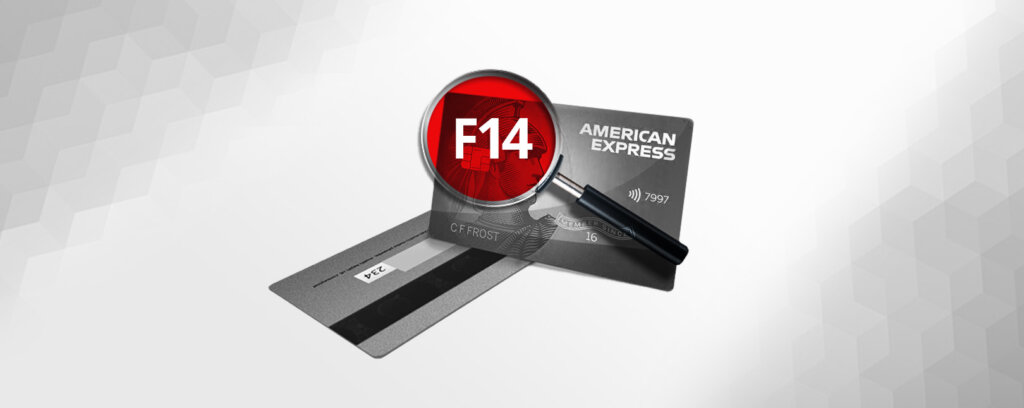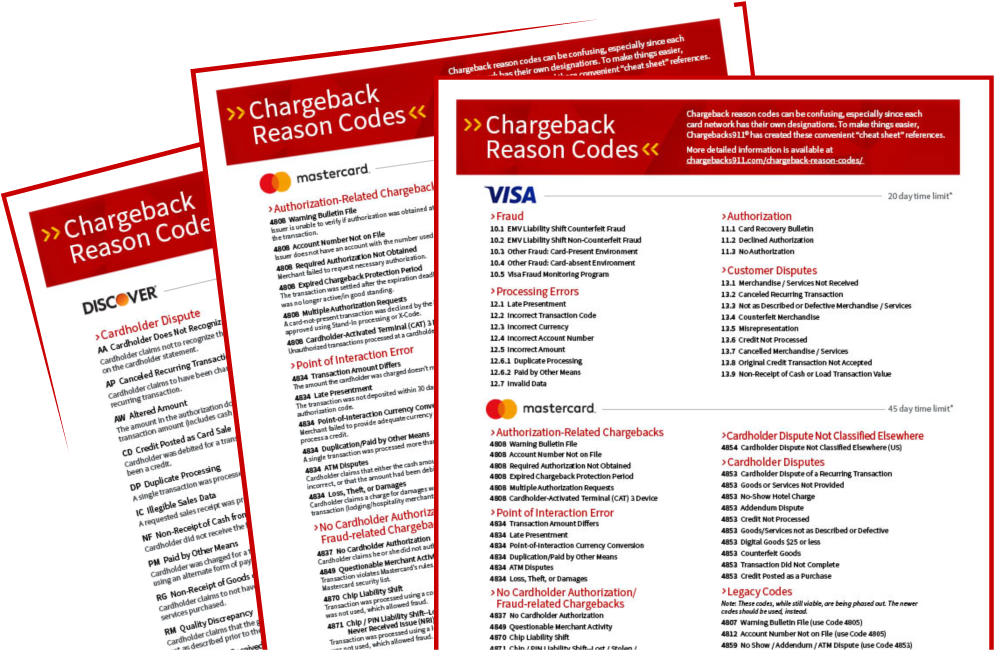
How to Handle Amex Reason Code F14 Chargebacks
American Express breaks down the acceptable causes for a customer to dispute a credit card transaction in their dispute guidelines. This is done for the sake of simplicity and standardization.
Each chargeback trigger has a designated “reason code.” Amex can then assign the appropriate code to each case to show the given reason for the chargeback.
Learn more about Amex reason codes
Today, we’re looking at one reason code in particular — F14 — and exploring the causes, timeframes, fees, and other specifics. We’ll also explore what you can do to prevent these chargebacks from happening.
Recommended reading
- Best Credit Card Processing Companies of 2025 REVEALED
- Chargeback Stats: All the Key Dispute Data Points for 2025
- Mastercard Chargeback Time Limits: The 2025 Guide
- Chargebacks911® Gets in the Game for the Special Olympics!
- Chargebacks911® Food Drive in Support of The Kind Mouse!
- Can You Dispute A Dispute? Yes — Here’s What to Do
What is American Express Reason Code F14?
American Express chargeback reason code F14 is “Multiple ROCs.” This reason code is used to explain that the Amex cardholder agree to participate in a transaction. However, the merchant submitted multiple records of charge (or “ROCs”).
Within the Amex ecosystem, an ROC is a paper or electronically reproducible record of a transaction. It includes all the following information about a transaction:
- The card number and card expiration date
- The date of the charge
- The amount of the charge, including any taxes
- Authorization approval code (if required for transaction in question)
- Description of the goods or services purchased
- Business name, address, and establishment number assigned by Amex
- Cardholder’s signature (for card-present purchases)
What Caused This Dispute?
Amex Chargeback Reason Code F14 is primarily issued when a cardholder agrees to participate in a transaction, but the merchant submits multiple records of charge. In effect, the merchant submitted records showing that a buyer was charged multiple times.
This scenario can arise due to:

How to Respond to Amex Reason Code F14 Chargebacks
So, what happens if a merchant can prove that only one ROC was submitted?
Naturally, if one receives an Amex reason code F14 chargeback, they’ll want to resolve the issue right away. If a merchant feels that a chargeback was filed in error, they should file a dispute response. This is done through a process called representment.
Representment is the process through which a merchant can challenge a chargeback. They provide evidence to the card issuer (in this case, American Express) that all aspects of the transaction were legitimate and in accordance with the card issuer's policies. This can involve several key pieces of evidence.
Also, remember that there’s a strict time limit to consider. Merchants have just 20 days in which to submit a response to American Express. However, this time frame also includes the time it took for the acquirer to provide a dispute notification, as well as time spent by the acquirer reviewing and submitting the case. In practical terms, merchants often have five days or less in which to prepare and submit a response.
Acceptable Evidence for Amex Reason Code F14 Responses
Merchants can re-represent these charges under the condition that they have compelling evidence.
For American Express reason code F14 chargebacks, the merchant needs to provide proof that all ROCs submitted were for valid charges. In other words, proof that the buyer authorized multiple transactions. Examples include:
- A signed sales draft or receipt for the charge in question.
- Proof that the cardholder verified and agreed to the terms of the purchase.
- Shipping information showing that the charge in question was for a different transaction.
Alternatively, the merchant might have already issued a credit to the buyer as a way of trying to avoid the dispute. In this case, the seller needs to offer proof that they already provided a credit to offset the amount charged.
The success of representment depends on the thoroughness and relevance of the evidence provided. Maintaining detailed records of transactions and communications with customers is vital to effectively counteract all chargebacks, including those under reason code F14.
How to Prevent Amex Reason Code F14 Chargebacks
As the old adage goes, “an ounce of prevention is worth a pound of cure.”
Merchants may never be able to stop chargebacks entirely. But, they can limit exposure to risk and keep your chargeback ratio in good standing by adopting a few best practices. When talking about this reason code specifically, merchants need to ensure they only submit transactions for valid purchases made by the cardholder.
Merchants will need to:
#1 | Get Valid Authorization
Always include a valid authorization approval when submitting charges for processing. This serves as proof that the transaction was approved by the cardholder's bank, safeguarding against unauthorized transaction disputes.
#2 | Respect Declined Authorizations
If a transaction is declined during the authorization process, don’t attempt to submit it. A declined authorization is a clear signal from the card issuer about the transaction's invalidity. Pushing it through can lead to disputes and chargebacks.
#3 | Maintain Accurate Transaction Records
Keep detailed and organized records of all transactions, including receipts, customer communications, and proof of delivery. These documents are crucial for disputing chargebacks, demonstrating the legitimacy of the transaction, and customer consent.
#4 | Update Your Software
Outdated fraud prevention solutions may fail to intercept new threats, while other outdated technologies can be exploited by fraudsters. Keep up with all software updates and patches and deploy them as soon as possible.
#5 | Know Key Fraud Red Flags
New customers — especially those making a high-value purchase — should be subject to additional screening. Other factors like transaction velocity, requesting expedited shipping, and billing address mismatches are signs of possible fraud as well.
#6 | Adopt a Multilayer Approach
Use a number of fraud detection tools that can work together to strengthen and reinforce one another. Proxy piercing, geolocation, CVV verification, and address verification are just a few examples.
Take a Wider View
You can dispute invalid chargebacks from Amex reason code A02. However, it’s much more efficient to take a proactive stance. The same is true of the other chargeback reason codes, as well. A truly effective chargeback management strategy must encompass prevention as well as disputing cases of friendly fraud.
Chargebacks911® can help your business manage all aspects of chargeback reason codes with proprietary technologies and experience-based expertise. Contact us today for a free ROI analysis to learn how much more you could save.
FAQs
Does Amex investigate chargebacks?
Yes. American Express investigates chargebacks by reviewing the evidence provided by both the merchant and the cardholder to determine the legitimacy of the transaction and decide on the chargeback claim. This process ensures a fair resolution based on the documentation and arguments presented by both parties.
What is the reason code for a chargeback on American Express card?
An American Express chargeback reason code is a code that identifies the specific reason a cardholder or issuing bank has disputed a transaction, guiding the merchant on the nature of the dispute and what evidence may be required to contest it. Each code corresponds to a particular issue, such as unauthorized use, processing errors, or non-receipt of goods or services. Click here to see a full list of Amex reason codes.
Do police investigate chargebacks?
Police typically do not investigate chargebacks as they are considered a dispute between the merchant and the cardholder, handled through the card issuer's internal processes. However, if fraud is suspected as the cause of a chargeback, law enforcement may be involved in investigating the fraudulent activities.
How successful are Amex disputes?
The success of an American Express dispute depends on the merchant's ability to provide compelling evidence that the transaction was valid and in accordance with Amex policies. Success rates vary widely based on the nature of the dispute and the quality of the documentation provided by the merchant.
How does American Express investigate disputes?
American Express investigates disputes by reviewing documentation and evidence provided by both the cardholder and the merchant, such as transaction receipts, proof of delivery, or communication records, to determine the validity of the chargeback claim. This process aims to ensure a fair resolution based on the facts presented by both parties.









